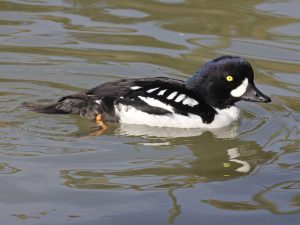BY HARRY WEEKES
 My morning walk loops around by the Indian Creek pond. It’s invariably dark as I come down canyon, and it’s usually early. The acoustics of the walk are such that I get to hear the intermittent quacking of ducks, mostly just one or two short, sharp grunts. Or so it goes in the fall.
My morning walk loops around by the Indian Creek pond. It’s invariably dark as I come down canyon, and it’s usually early. The acoustics of the walk are such that I get to hear the intermittent quacking of ducks, mostly just one or two short, sharp grunts. Or so it goes in the fall.
When winter sets in, as it nicely has, that occasional quack becomes a subtle conversation of quacking as the winter ducks return. This is when I head out in the light, with binoculars, a small sketchbook and, if I’m lucky, a reluctant “volunteer” in tow to see which birds have returned.
This time, Simon and I headed down on the first official day of winter, with him grousing from the start. To take his mind off the slog, I wondered out loud about the ducks. There they were, living their lives up in Canada, when some series of cues kicked in—daylight, temperature, vanishing food—that caused them to take to the air and find this tiny speck of a pond in the vast landscape of Idaho. Looking out at the birds bobbing and diving, I asked, “If you were one of these ducks, do you think you would be able to explore the entire pond in one season, or would it take you a couple of years?”
“One year, easily,” Simon responded, without even thinking.
“I think it would take me a couple of seasons, at least,” I said.
“Yeah, because you’re soft. You’re a big soft duck.”
Such was the depth and extent of our conversation, which ended when I perched on a picnic table and started scanning the water. For his part, Simon lay down on the ground.
From right to left, I saw some familiar faces. Gadwall. Barrow’s goldeneye. Ring-necked duck. American wigeon. Common merganser. And the lone mammal—a muskrat propelling itself across the surface.
The big ducks bobbed like buoys as the divers arched and disappeared beneath the surface of the water. The entire time, the birds moved about gently, often in pairs, doing little more than eating, preening, and tucking their heads back on their shoulders to sleep. We stayed no more than 20 minutes.
And that was it. No explosive flocks. No gaudy displays. No “Did you see that?!” moments. Just ducks, paddling around on a pond on the first day of winter.
It is easy for me to understand why Simon is at least perplexed by my behavior. The world that is now at his fingertips is a never-ending suite of hockey highlights, social media memes, TV shows, movies, audio clips, and just about anything he wants. Ducks, floating on the water, don’t seem to stand a chance in comparison, which is, perhaps, why I make him come with me.
When Hilary returns, having just come from running past the pond, she says, “I saw all the mallards.”
“Nope, no mallards,” I respond, realizing there is still a lot of work to be done.
Harry Weekes is the founder and head of school at The Sage School in Hailey. This is his 48th year in the Wood River Valley, where he lives with Hilary and two of their three baby adults—Penelope and Simon. The other member of the flock, Georgia, is currently fledging at Davidson College in North Carolina.
